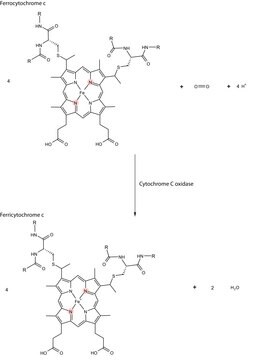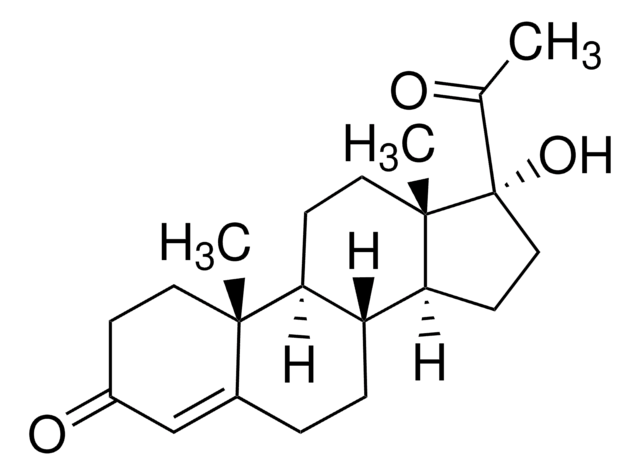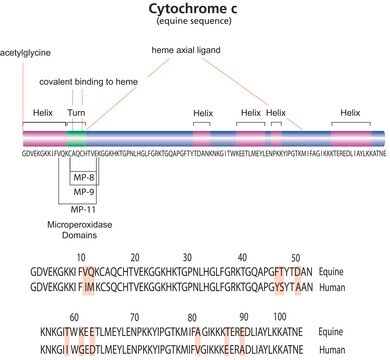QIA87
Cytochrome c Release Apoptosis Assay Kit
Se connecterpour consulter vos tarifs contractuels et ceux de votre entreprise/organisme
About This Item
Code UNSPSC :
41116133
Produits recommandés
Utilisation
sufficient for 100 tests
Niveau de qualité
Fabricant/nom de marque
Calbiochem®
Conditions de stockage
OK to freeze
avoid repeated freeze/thaw cycles
Technique(s)
immunoblotting: suitable
Entrée
sample type cell extract(s)
Température de stockage
−20°C
Description générale
Assay kit provides a unique combination of reagents useful for the isolation of a highly enriched mitochondrial fraction from the cytosol. Translocation of cytochrome c from the mitochondrial fraction to the cytosol is monitored by immunoblotting with the cytochrome c antibody provided with the kit.
Composants
Mitochondria Extraction Buffer, Cytosol Extraction Buffer, Protease Inhibitor Cocktail, Reducing Reagent, Cytochrome c Antibody, and a user protocol.
Avertissement
Toxicity: Multiple Toxicity Values, refer to MSDS (O)
Caractéristiques
Assay Time: 4 h
Principe
The Cytochrome c Release Apoptosis Assay Kit provides a unique combination of reagents useful for the isolation of a highly enriched mitochondrial fraction from the cytosol that can be used to detect cytochrome c by Western blotting.
Notes préparatoires
• 1X Cytosol Extraction Buffer: Prepare 1X Cytosol Extraction Buffer by adding the 20 ml 5X Cytosol Extraction Buffer to 80 ml diH2O; mix well.• Mitochondria Extraction Buffer Mix: Just prior to performing the assay, prepare enough Mitochondria Extraction Buffer Mix for the number of samples to be assayed; each sample requires 0.1 ml of the mix. To prepare 1 ml Mitochondria Extraction Buffer Mix, add 2 µl 500X Protease Inhibitor Cocktail and 1 µl DTT to 1 ml Mitochondria Extraction Buffer; mix well.• Cytosol Extraction Buffer Mix: Just prior to performing the assay, prepare enough Cytosol Buffer Mix for the number of samples to be assayed; each sample requires 1 ml of the mix. To prepare 1 ml Cytosol Extraction Buffer Mix, add 2 µl 500X Protease Inhibitor Cocktail and 1 µl DTT to 1 ml Cytosol Extraction Buffer; mix well.
Stockage et stabilité
Upon arrival store the entire contents of the kit at -20°C. Once opened, store the Mitochondria Extraction Buffer and Cytosol Extraction Buffer at 4°C and the remaining components at -20°C.
Autres remarques
Due to the nature of the Hazardous Materials in this shipment, additional shipping charges may be applied to your order. Certain sizes may be exempt from the additional hazardous materials shipping charges. Please contact your local sales office for more information regarding these charges.
Informations légales
CALBIOCHEM is a registered trademark of Merck KGaA, Darmstadt, Germany
Code de la classe de stockage
8A - Combustible corrosive hazardous materials
Certificats d'analyse (COA)
Recherchez un Certificats d'analyse (COA) en saisissant le numéro de lot du produit. Les numéros de lot figurent sur l'étiquette du produit après les mots "Lot" ou "Batch".
Déjà en possession de ce produit ?
Retrouvez la documentation relative aux produits que vous avez récemment achetés dans la Bibliothèque de documents.
Syed Suhail Andrabi et al.
Disease models & mechanisms, 10(6), 787-796 (2017-04-02)
Organelle damage and increases in mitochondrial permeabilization are key events in the development of cerebral ischemic tissue injury because they cause both modifications in ATP turnover and cellular apoptosis/necrosis. Early restoration of blood flow and improvement of mitochondrial function might
Yin Liu et al.
Virology, 360(2), 364-375 (2006-12-13)
We previously showed that infection of rat oligodendrocytes by ultraviolet light-inactivated mouse hepatitis virus (MHV) resulted in apoptosis, suggesting that the apoptosis is triggered during cell entry. To further characterize the earliest apoptotic signaling events, here we treated cells with
Role of the mitochondrial signaling pathway in murine coronavirus-induced oligodendrocyte apoptosis.
Yin Liu et al.
Journal of virology, 80(1), 395-403 (2005-12-15)
A previous study demonstrated that infection of rat oligodendrocytes by mouse hepatitis virus (MHV) resulted in apoptosis, which is caspase dependent (Y. Liu, Y. Cai, and X. Zhang, J. Virol. 77:11952-11963, 2003). Here we determined the involvement of the mitochondrial
Gurdeep Marwarha et al.
Biomedicines, 10(1) (2022-01-22)
Apoptotic cell death of cardiomyocytes is a characteristic hallmark of ischemia-reperfusion (I/R) injury. The master hypoxamiR, microRNA-210 (miR-210), is considered the primary driver of the cellular response to hypoxic stress. However, to date, no consensus has emerged with regards to
Notre équipe de scientifiques dispose d'une expérience dans tous les secteurs de la recherche, notamment en sciences de la vie, science des matériaux, synthèse chimique, chromatographie, analyse et dans de nombreux autres domaines..
Contacter notre Service technique





